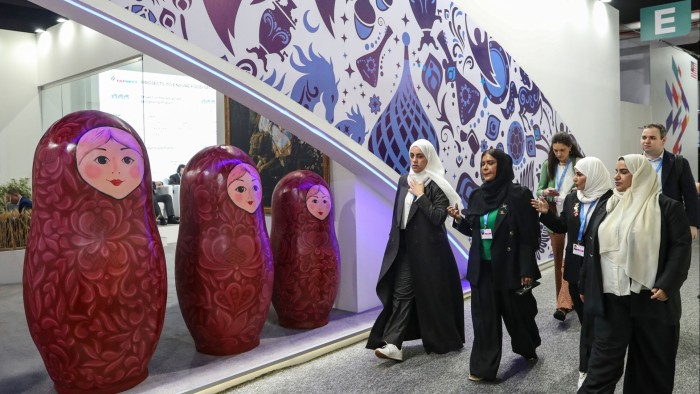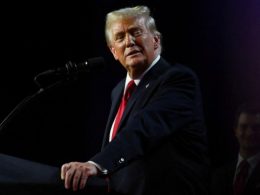Russia has urged US president-elect Donald Trump to remain in the Paris agreement, while Saudi Arabia said at the UN COP29 summit in Baku that it was committed to making the transition to a green energy system.
The oil and gas producers’ statements reflect the upside-down geopolitics of the summit, where uncertainty has been cast by the threat of a US withdrawal from the pact.
This grew as Argentina’s President Javier Milei withdrew his country’s 20-strong negotiating team from the summit and raised the spectre of an exit from the Paris agreement.
In Baku, Azerbaijan, countries that have historically been viewed as blockers of progress at global climate talks defended the Paris agreement, the landmark accord backed by almost 200 countries that underpins efforts to tackle rising temperatures.
Boris Titov, Russian President Vladimir Putin’s special representative for international co-operation in sustainability, told the Financial Times on Friday he was “sure it is not” the right move for countries such as Argentina and the US to leave the Paris agreement.
“We have to work with the Paris agreement . . . we cannot withdraw from Paris but we can make it more efficient,” he said.
In Brussels, EU officials have voiced concerns about a domino effect if Trump quits the Paris agreement as well as the more dangerous possibility of the US withdrawing from the 1992 parent treaty, the UN Framework Convention on Climate Change.
This has led the EU and the outgoing US Biden administration to court both the private sector and China in an effort to bolster climate action.
Saudi Arabia has been long-regarded as a block to negotiations at COP29, but its envoy, Khalid Almehaid, deputy minister of sustainability and climate change and chief climate negotiator, said the Paris agreement had posed a “great challenge” but that the country had decided it wanted to be “part of the train”.
“It was very clear at that time [of the Paris agreement], the most impacted countries [were] going to be oil-producing countries, especially oil-producing countries that are developing countries,” he said.
But he added: “We are part of the train . . . we are going to make sure that we are going to be a leader,” he said, adding that Saudi Arabia had focused on renewable energy, energy efficiency and how to capture greenhouse gas emissions from fossil fuels.
Almehaid said that by the end of this year, the country would have 44GW in renewable energy, up from less than 1GW in 2022. “If Saudi Arabia can transition, I think anyone in the world can transition,” he said, “We would like to see all oil producer [countries] follow suit in making sure they really do fully integrate climate change and future transition.”
Earlier in the week, China also issued a call for the incoming Trump administration to continue working with the Asian country on tackling climate change. The US and China are the world’s two largest emitters.
Speaking at an event organised by the Climate Reality Project, a non-profit organisation, in Baku, Al Gore, the former US vice-president, described COP29 as a “challenging COP”, adding that it was in the “shadows of oil . . . and geopolitics”.
He also warned that western countries were losing ground to emerging markets, especially China, when it came to climate change and the energy transition, especially as China rapidly deployed renewables.
“In the years ahead, watch for China to claim global leadership in accelerating this shift and, all of a sudden, the west is vulnerable to being categorised as the bad guy,” he said.
Countries that are vulnerable to climate change also highlighted the importance of the agreement on Friday.
Cedric Schuster, minister of natural resources and environment for Samoa and chair of the Alliance of Small Island States (Aosis), said: “Aosis is here to defend the Paris agreement.”
Gideon Behar, Israel’s special envoy for climate change and sustainability, also backed the Paris agreement. “For us, the Paris agreement is important and we see the UNFCCC as the most authorised body to deliver decisions and consensus on climate issues,” he told the FT.
He added that the UN Conference of the Parties (COP) process, which brings together negotiators and ministers from around the world to agree consensus positions, remained critical.
“Without the mechanism that we have today, we would be in a totally different situation so the COPs are important and the process is important. The international national dialogue that happens is important,” Behar said.
Despite the US being the only country to leave the Paris accord in the first Trump term, before joining again under President Biden, the fears of contagion loomed. Marciano Dasai, Suriname’s environment minister, told the FT: “If Argentina and the USA pull out, the Paris agreement risks falling apart completely. There is no plan on planet B.”
But he also complained that Suriname was, like Argentina, “tired of being sidelined” and resented the lack of finance for protecting its rainforest. “The international community has shown a total lack of respect for South America and the crucial role our countries play in mitigating climate change,” he said.
Climate Capital
Where climate change meets business, markets and politics. Explore the FT’s coverage here.
Are you curious about the FT’s environmental sustainability commitments? Find out more about our science-based targets here
Source link









